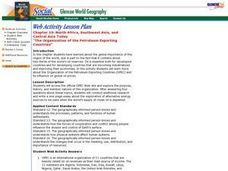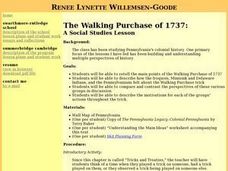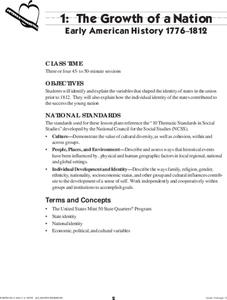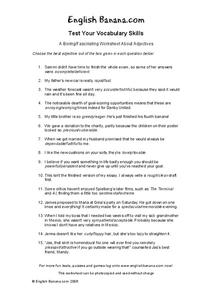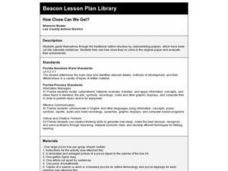Curated OER
Learning About Weather
Students decide what type of weather they would like to write about such as tornadoes, hurricanes, snow, hail, floods, or another type of weather.
Then, they look up the information and jot down notes about that particular subject....
Curated OER
An Amusing Speech
Students think of something amusing that happened to them in their lives. They then write down specific notes on note cards and practice their speech at home so they can present it to the class.
Curated OER
Artifact Puzzles
Pupils role-play the position of archaeologists to determine the different types of artifacts. They cut out a drawing of their object and connect them with their classmates objects. They write an essay about their object and where it was...
Curated OER
The Overextended Society/The Conservative Ascendancy
Students write an essay presenting their understanding of presidential elections and the issues related to presidential elections. Students discuss the effect of immigration on the United States and the major points that swung the nation...
Curated OER
Countries and Cultures
In this countries and cultures worksheet, young scholars write definitions for various terms, complete a description of a trip around Europe by adding articles, and write an essay about places to visit in their own country.
Curated OER
The Organization of the Petroleum Exporting Countries
Pupils investigate the global importance of the African and Asian countries that export petroleum. They access the OPEC website and research this organization. They answer questions and write an essay about alternative energy sources.
Curated OER
Jints and Hannah
Students examine photographs of slaves, and listen to various first person accounts of life as a slave. Students write essays describing the relationship between the woman and the child in the photograph.
Curated OER
Lesson Plan: Spain has its own immigration issues. How does it compare to ours?
Young scholars investigate the issue of immigration in North Carolina and Spain. They compare/contrast immigration in both and exchange opinions about possible solutions. In addition, they write an essay proposing North Carolina...
Curated OER
Collaborative Book Club Groups
Students participate in book club forums where they write descriptive, evaluation, analysis, synthesis, or inference essays. They take on the role of a character in their bok and publish a web page.
Curated OER
Lewis and Clark Encounters with Native Americans
Students research what the exchange was between the various Native American groups and Lewis and Clark. They are able to write reflections after truly considering the issue with the help of research.
Curated OER
Understanding Science Fiction
Fourth graders learn about the genre of science fiction. In this science fiction lesson, 4th graders learn about the characteristics of science fiction as a genre. They write an original piece of science fiction.
Curated OER
Your Next Class Trip
Students write a persuasive argument to their principal to take their class trip to a destination of their choice. They must transfer the written argument into a website. They also focus on what it takes to plan a trip.
Curated OER
Mississippi Delta Blues Moves: Second in a Series of Three with Barb Hoffman and Steve Hoskins, MGM
Learners complete a graphic organizer reviewing Barb Hoffman's prior lesson plan," Slave Songs (1840-1876)" as well as listen to and discuss Delta Blues music samples. Students research one Delta Blues singer and write a "color coded"...
Curated OER
The Walking Purchase of 1737
Students review the main points of the Walking Purchase of 1737. In groups, they describe how the Iroquois, Minisink, and Delaware Indians felt about the purchase and compare and contrast the different views. They write and perform a...
Curated OER
Rings of Passion: Five Emotions in World Art
Pupils examine pieces of art and write a short essay on what emotions they feel by viewing it. They view a video clip and complete chart as they watch. They discuss how the writers of the program showed emotions in the clips.
Curated OER
Oregon Cities
Students research one 20th century Oregon city, focusing on its population changes and the reasons for the changes. They write an expository essay which includes graphs/charts.
Curated OER
Out of Sight, Out of Mind
High schoolers examine conditions at state mental hospitals after World War II. They examine the treatment of patients and how to evaluate the credibility of sources. They write a short essay to complete the activity.
Curated OER
Index Card Jigsaw
Students explore accomplishments of historical figures. Through participation in a hands-on activity, teams of students match names, quotes, views and political party affiliation to the correct picture. They create a chart from the...
Curated OER
Social Studies: What Is Folklife?
Students read an essay about folklife and record their thoughts in journals. After discussing the terms associated with the topic, they complete worksheets on types of folklife, pop, elite, and folk cultures. Depending on the age group,...
Curated OER
What is a Solution?
In this solutions worksheet, students read about how people first learned to use metals and to combine metals to form alloys. Students write an essay telling the story of how ancient people first learned to cause physical changes in metal.
Ohio Literacy Resource Center
Arguing with Aristotle Ethos, Pathos, Logos
Introduce your classes to the Art of Rhetoric with a lesson that focuses on Aristotle's persuasive appeals and how they have been used, both ethically and unethically, to influence opinion.
US Mint
The Growth of a Nation
Young historians explore the identity of the early United States in this four-part instructional activity series. Working in groups of three, students research the political, economic, and cultural atmosphere of each member of the...
Curated OER
A Boring/Fascinating Worksheet About Adjectives
In this adjectives activity, learners read the sentences and choose the best adjectives out of the two to complete the 15 exercises.
Curated OER
How Close Can We Get?
Fourth graders guide themselves through the traditional outline structure by reassembling papers, which have been cut into separate sentences. They see how close they've come to the original paper and evaluate their achievement.







